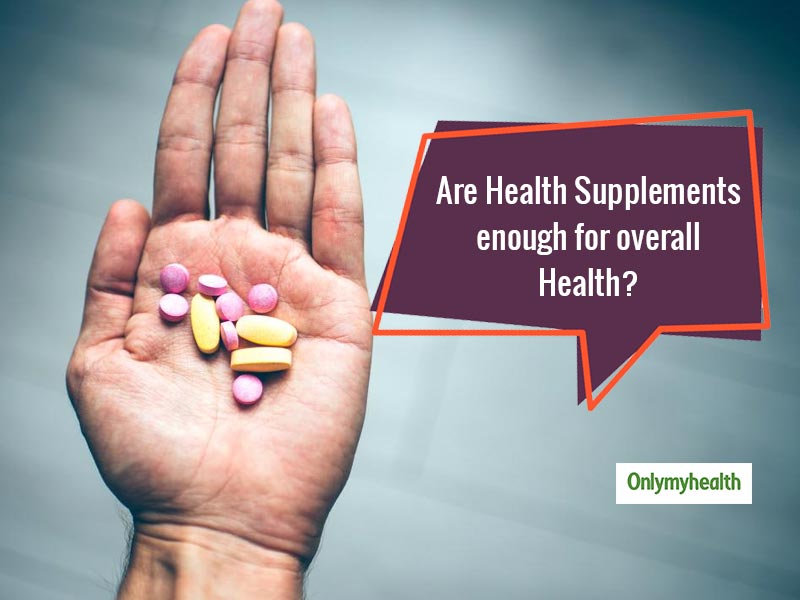
The debate about health supplements is endless; some praise its benefits while others shun it due to its side effects. A stressful lifestyle leads to digestive problems, not allowing proper absorption of nutrients. However, letting supplements take over nutritional needs is a common mistake that people make. Sr. Dietician Priya Bharma, Sri Balaji Action Medical Institute says, “Whole foods can never be substituted with supplements as supplements complement your diet. Nothing works better than eating a balanced diet.”
Table of Content:-
Are they needed?

Internal medicine, Dr Ratan Kumar Vaish, Rockland Hospital says, “To understand the needed supplement intake for your body, some guidelines like RDA (Recommended Dietary Allowance) and AI (Adequate intake) are the needed amount of vitamin and mineral needed to stay healthy. They are tailored to women, men, and specific age groups. Talk to your doctor about the supplements and the right doses appropriate for you. Be sure to ask about the possible side effects and interactions with any medications you take. Your calories consumption in a day should be at least 1600 calories.”
Dr Bhuta adds, “It happens that people often don’t eat a variety of food in a day, leading to nutritional deficiencies. Some supplements might help you to get the needed nutrients to stay fit only it should be taken as per the doctor’s advice.”
Also Read: Ketone supplement can help manage blood sugar levels
Whole foods over pills

Eating a balanced diet provides your daily dose of dietary nutrients. Isolating any one nutrient in the form of a supplement you lose out on the benefits of other nutrients. Eating a whole orange will give you fibre and antioxidants in addition to Vitamin C as opposed to taking a vitamin C tablet. Talking of the risks associated with supplements, Nutritionist Neelanjana Singh said, “Some supplements tend to activate the immune system. Those having autoimmune diseases should avoid eating health supplements as it may just worsen the disease. Supplements can hamper the effect of other medicines, like people taking blood thinners should avoid taking Vitamin K supplements.
Supplements for women and men
- Vitamin A: This antioxidant boosts immune systems, improves vision and cuts the risk of heart disease. The recommended daily dosage: 2,300 international units.
- B Vitamins: B9 (folic acid) is the most important for young women. It helps in keeping the red blood cells healthy and guards against cancer and congenital disabilities. The recommended dose is 400 micrograms (mcg); 600 mcg if you’re pregnant
- Vitamin C: This antioxidant boosts the immune system and helps to prevent heart disease, prenatal problems, and eye illnesses.
- Vitamin D: D helps calcium absorption and plays a central role in muscle function. Its recommended daily dosage is 1,000 to 2,000 IU
- Iron: It can spell anaemia (a lack of red blood cells) and a weakened immune system. The recommended daily dosage of this supplement should be 18 mg.
Also Read: Sports Supplements: The Importance of Taking Supplements for Gym Enthusiasts and Its Benefits
Supplements for kids

Nutritionist Neelanjana Singh adds, “The calcium requirement for ages 1 to 3 is 500 mg a day, 4 to 8 is 800 mg a day, and 9 to 18 is 1,300 mg a day. For kids, it is advised to fulfil the nutritional needs by eating a balanced diet rather than resorting to supplementing pills.”
It is safe for them?
Supplements can be taken at any age by anyone, with supervision by a doctor of course. Children can be given calcium; vitamin or multivitamin supplements, but clear it from a doctor first. Women can also consume it at any age, but should especially take it during pregnancy and once they cross 50 years of age. Men between 31 to 50 years of age usually need vitamin and mineral supplements as they tend to eat more junk while grabbing a quick bite during office hours.
Read more articles on Other Diseases
How we keep this article up to date:
We work with experts and keep a close eye on the latest in health and wellness. Whenever there is a new research or helpful information, we update our articles with accurate and useful advice.
Current Version